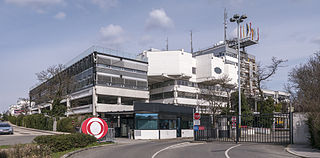A television network or broadcaster is a telecommunications network for distribution of television program content, where a central operation provides programming to many television stations or pay television providers. Until the mid-1980s, television programming in most countries of the world was dominated by a small number of terrestrial networks. Many early television networks evolved from earlier radio networks.

NRK, an abbreviation of the Norwegian Norsk rikskringkasting AS, generally expressed in English as the Norwegian Broadcasting Corporation, is the Norwegian government-owned radio and television public broadcasting company, and the largest media organisation in Norway. All other TV channels, broadcast from Norway, were banned between 1960 and 1981. NRK broadcasts three national TV channels and three national radio channels on digital terrestrial television, digital terrestrial radio and subscription television. All NRK radio stations are streamed online at NRK.no, which also offers an extensive TV service. NRK is a founding member of the European Broadcasting Union.

Österreichischer Rundfunk is an Austrian national public service broadcaster. Funded from a combination of television licence fee revenue and limited on-air advertising, ORF is the dominant player in the Austrian broadcast media. Austria was the last country in continental Europe after Albania to allow nationwide private television broadcasting, although commercial TV channels from neighbouring Germany have been present in Austria on pay-TV and via terrestrial overspill since the 1980s.
Simulcast is the broadcasting of programs or events across more than one resolution, bitrate or medium, or more than one service on the same medium, at exactly the same time. For example, Absolute Radio is simulcast on both AM and on satellite radio. Likewise, the BBC's Prom concerts were formerly simulcast on both BBC Radio 3 and BBC Television. Another application is the transmission of the original-language soundtrack of movies or TV series over local or Internet radio, with the television broadcast having been dubbed into a local language.
The Radio-télévision belge de la Communauté française is a public service broadcaster delivering radio and television services to the French-speaking Community of Belgium, in Wallonia and Brussels. Its counterpart in the Flemish Community is the Dutch-language VRT, and in the German-speaking Community it is BRF.

ARD is a joint organisation of Germany's regional public-service broadcasters. It was founded in 1950 in West Germany to represent the common interests of the new, decentralised, post-war broadcasting services – in particular the introduction of a joint television network.

Mediaset Italia S.p.A., also known as Mediaset in Italian, is an Italian-based mass media company which is the largest commercial broadcaster in the country. The company is controlled by the holding company MFE - MediaForEurope. Founded in 1987 by former Italian prime minister Silvio Berlusconi, the group competes primarily against the public broadcaster RAI, the privately owned La7 and Comcast's Sky Italia.

NBC Europe was a satellite television network based in the United Kingdom that broadcast across Europe, and it was picked up by various European cable systems where available.
Hitradio Ö3 is one of the nationwide radio stations of Austria's public broadcaster ORF. The format focuses on contemporary hit radio, specialising pop music and chart hits from the 1980s to the present. Ö3 has the biggest audience share by far of all Austrian radio stations.
DZRJ-DTV is an independent television station licensed to Makati City, Metro Manila, Philippines. The station is the flagship TV property of Rajah Broadcasting Network, Inc., a broadcast company owned by long-time guitarist/musician Ramon "RJ" Jacinto. The station's broadcast facilities are located at the Ventures I Bldg., Makati Ave. cor. Gen. Luna St., Makati; and its digital TV transmitter is situated at Brgy. San Roque, Antipolo, Rizal.

Tele 5 is a German free-to-air television channel that broadcasts classic American films and series and Japanese anime.

TeleRadyo is a Philippine pay television channel owned by the ABS-CBN Corporation under the ABS-CBN News and Current Affairs brand, and is available on cable providers throughout the Philippines. TeleRadyo is also included as an exclusive (free-to-view) digital subchannel on digital terrestrial television via the ABS-CBN TVplus service. TeleRadyo is also simulcast via The Filipino Channel (TFC) and it can be heard and viewed online via DZMM's YouTube channel, ABS-CBN Radio Service App and iWant TFC. The channel was previously used to simulcast the programs of ABS-CBN's flagship AM radio station, DZMM 630. At 8:20 PM on May 5, 2020, the station went off the air due to a cease and desist order of the National Telecommunications Commission together with ABS-CBN, S+A, and MOR Philippines. After DZMM 630 kHz was shut down, DZMM TeleRadyo was renamed simply as TeleRadyo. Although it also went off-air a few minutes after, the channel went back on-air and online on May 8, 2020, resuming the programming of the former DZMM. On June 28, 2021, Teleradyo launched a high-definition feed on YouTube and Facebook while selected shows are being broadcast on Kapamilya Channel and The Filipino Channel in HD.
The television industry in China includes high-tech program production, transmission and coverage. China Central Television is China's largest and most powerful national television station. By 1987, two-thirds of people in China had access to television, while today, over 3,000 channels are available in the country.
Television in Italy was introduced in 1939, when the first experimental broadcasts began. However, this lasted for a very short time: when fascist Italy entered World War II in 1940 all transmissions were interrupted, and were resumed in earnest only nine years after the end of the conflict, on January 3, 1954.
Television in Switzerland was introduced in 1950, with regular broadcasts commencing in 1953. People who live in Switzerland are required by law to pay a television licence fee, which is used to finance the public radio and television service SRG SSR. Licence fee-payers in all the linguistic regions of Switzerland all pay the same amount, 365 CHF (per day? month?) since 01/01/2019, counting both radio and television licences) and in return, are entitled under the law to services of equal quality. The fee is charged per household and not per person, with empty dwellings being exempt.

RTL9 is a French-language Luxembourgish television channel shown in Luxembourg, France, Monaco, Africa and the French-speaking regions of Switzerland.

VH-1 Deutschland was a localized German version of the Viacom channel VH1 that was on air from 1995 to 2001. The program was operated by Me, Myself & Eye Entertainment GmbH, the former editorial office of Tele 5's predecessor musicbox, in cooperation with MTV Networks Europe.
Leonine Holding GmbH, formerly Tele München Group, is a media company based in Munich.
ZDF Musikkanal was the name of a television channel operated by ZDF which had started broadcasting on 1 January 1984 as part of the cable pilot projects in West Germany. The station broadcast a moderated programme with a thematic focus on music. The programmes broadcast came almost exclusively from the archives of the ZDF main programme.









